Hey WNVM-ers,
As we close out the longest shortest month of the year, we bring you a music themed issue! First, Fawnia (me, hi!) talks to ICON Margaret Cho about her new album, “Lucky Gift,” full of pop power anthems and love songs nodding toward an eclectic mix of ‘80s and ‘90s music genres and artists. Because this Gen X newsletter is also an official Bowen Yang stan account, Cho and I discussed how he helped inspire an ‘80s-referential punk pop banger. Note: In an unprecedented move, we’ve made an exception and used the lyrics of Cho’s title track — which does have roots in the ‘80s, referencing the ‘60s — as the story headline.
On the subject of throwback tributes, I also chatted with “American Idol” vet David Archuleta, who was born in 1990, about his remake of George Michael’s “Freedom! 90.”
PS: You may need to read the entire newsletter on your browser.
You Are Such a Lucky Gift
The national treasure on all the references, from Iggy Pop to Lilith Fair, in her new earworm-filled album.
I have been listening to Margaret Cho’s “Lucky Gift” nonstop since an early preview in January. The lyrics are clever, funny, touching, and intriguing. But, omg, the tunes are just oh-so-catchy — thanks to notable influences from seminal ‘80s and ‘90s pop artists that I still listen to today. (My Spotify Wrapped is like my teenage mixtape.)
“I've learned so much from all the people that I've collaborated with, and the singers and songwriters that I've just been friends with over the years,” says Cho, who collaborated with Garrison Starr and Roger Rocha on the album, and penned two of the tracks, including “Lucky Gift,” solo.
Let’s just say that the comedian, actor, and activist boasts some serious music bonafides. In 2007, she hosted Cyndi Lauper’s 15-city “True Colors Tour,” featuring the likes of Debbie Harry, Erasure, and the Indigo Girls, in support of the Human Rights Campaign, PFLAG, and the Matthew Shepard Foundation.
“I am friends with [Split Endz, and spin-off band Crowded House lead singer] Neil Finn,” adds Cho, who’s in the midst of her “Live & Livid” stand-up tour. “He taught me songwriting.”
For the title bop “Lucky Gift,” Cho inventively mixes inspo from across the generations and sub-genres: Australian/New Zealand pop rock, like Finn’s aforementioned bands, Bic Runga, and Flight of the Conchords, plus today’s queer pop artists, including Tegan and Sara, who Cho credits for her synth skills, Chappell Roan, and Troye Sivan.
“They've [all] helped me so much,” says Cho, whose last musical-comedy album, “American Myth” — a timely 2016 treatise on grief and loss — received a Grammy nomination. “So, I finally realized, ‘Oh, I've actually grown up as an artist in this way, and I can do more.”
I feel like I’ve grown up with Cho as a constant in my life, as she paved the way for Asian American representation in stand-up and on-screen. Friend of WNVM Aldo still remembers us watching Cho’s 1994 groundbreaking Korean American family sitcom “All-American Girl” together. (He also kept a circa-‘90s proto-“selfie” — like a paper photo — that Cho took of herself with his 35mm camera after a show.)
That's why I’m especially enjoying her having the best time — or so I’d like to think — in the wildest roles right now. I just delighted in her “Love Boat”-y guest-star turn as a smoothie-shilling wellness influencer on the expectedly outrageous hurricane episode of “Doctor Odyssey,” as well as her cameo as a member of an orgy-loving hippie commune in Cora Bora. My heart felt so full watching Cho as Erin, lesbian den mother to Bowen Yang, Matt Rogers, Tomás Mato, Torian Miller, and Joel Kim Booster in Fire Island, the 2022 queer take on Pride & Prejudice.
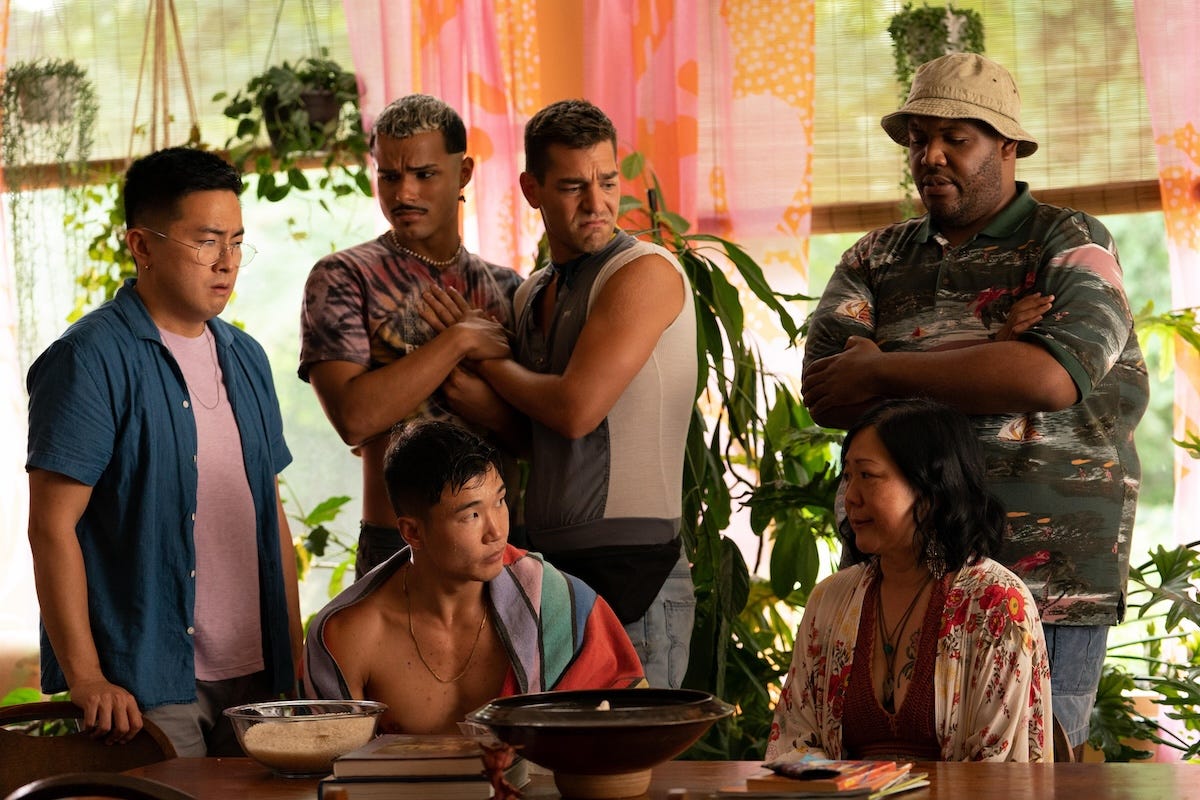
“I loved making that movie,” says Cho, who recently reunited with director Gregg Araki for his upcoming erotic thriller, I Want Your Sex. “When you watch it, it's exactly what we were doing off screen — eating in the pool, complaining, laughing, staying up too late,”
I also forever respect how Cho uses her hard-earned clout and platform to champion the next generations of multi-hyphenates, like Yang, Booster, and Atsuko Okatsuka. Cho also showcases up-and-coming talent, like Joy Ride’s Sabrina Wu, with her Joe’s Pub Vanguard Residency.
“It’s really exciting to watch them soar. I'm always hitting them up for jobs, like I want them to put me in everything, because I have to play their mom,” says Cho, with a laugh. “It’s very exciting. They always tell me how inspired they were by me, and I'm just really grateful.”
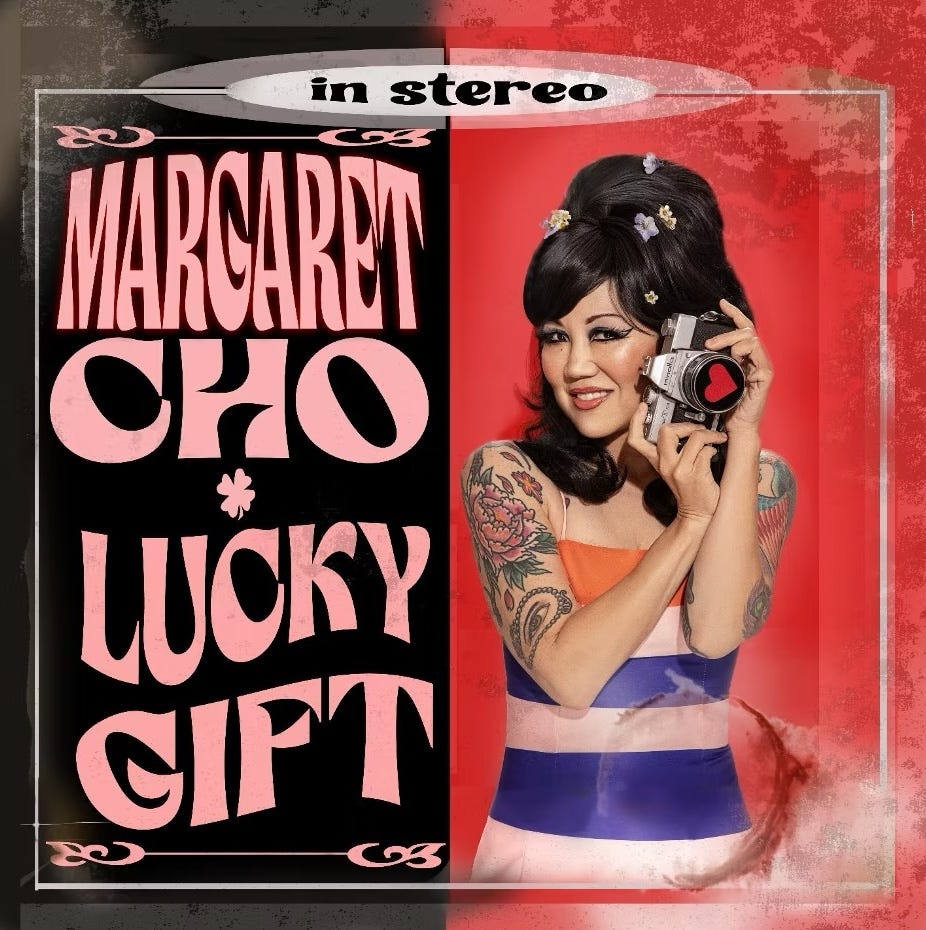
So, when I was listening to your new album, I couldn't help but play these little games in my head, like, ‘What ‘80s/‘90s artists does this remind me of?’ I think I heard The Breeders or Suzanne Vega… The B-52s, maybe Scandal?
I love that. Yes! It's Belle and Sebastian. Anybody that could have been in the Lilith Fair tour in the ‘90s: Liz Phair, Natalie Merchant and [Everything But the Girl’s] Tracey Thorne and The B-52s. There's a little Tom Petty and the Heartbreakers in there. Musically, I wanted to fit in that sweet spot where women were all about rock and heading up acoustic rock — whether that was Sarah McLachlan or Ani DiFranco or Joan Osborne. I love that period of music. Like, [Meredith Brooks’ ‘97 song] ‘I'm a bitch. I'm a lover…’ that kind of vibe with a slip dress on and acoustic guitar. I love that whole thing.
You've always had a lot of fun with self-expression through fashion, how did it evolve for this album and video for ‘Lucky Gift?’
Well, I wanted to have a ‘60s vibe. I love when Tracy Ullman did ‘They Don’t Know’ in 1983, and she was very ‘60s girl group pop. And I love The B-52s. I love that look and wanted to bring that look back. I love the album cover, which is done by my makeup artist John Stapleton. That look is so dramatic and exciting.”
I really like Tegan and Sara, too, because I’m so partial to ‘80s-referential music, with the synth and the drums. Chappell Roan also has such a distinct ‘80s sound. Why do you think the decade resonates so much with later generations?
Well, we are in a weird cold war situation, but the Cold War is not Russia. It's actually ‘woke.’ We're in some weird very right wing kind of time, like in the ‘80s, it was very right wing — dealing with the existential threat of Reagan and the nuclear holocaust. Now it's actually politically similar to what's happening now with this really awful administration, and all of the racist stuff going on. So weirdly, ‘80s style and music is coming back into fashion.
I think also, culturally, it was already there with things like ‘Stranger Things,’ and the ethos. But Chappell Roan is a perfect amalgamation of ‘80s aesthetics, but with a progressive point of view. So I love her. I love her music and I love her sound. It's very glam. It's very ‘80s. It's very gay pop.
I was also trying to parse your lyrics, which I'm terrible at, but I thought ‘Funny Man,’ was very moving. I know it's about the late Robin Williams and the opening sounds reminded me of Elton John.
It’s like my version of ‘Candle in the Wind’ for Robin Williams, because it's just that love affair that's personal, but also parasocial. Like I knew Robin, but not close. But I also knew him for a long, long time since I was a little kid. I loved Mork from Ork [on the ‘80s sitcom ‘Mork & Mindy’], and all of his movies and his comedy.
The song is really meaningful for me, and I played it a lot out on the street after he died [in 2014] for this project for people experiencing homelessness called Be Robin, which was a charity and outreach. We would give out food and supplies and money sometimes. All these musicians, like Bob Mould and Boots Riley, would get together. We would steal electricity, and play very loudly on the street.
But the song was really beautiful, and his death had just happened. Roger Rocha and I wrote that. We always were so moved whenever we got to play it, because it just helped make sense of the grief that we had around losing Robin Williams as a social figure, but also as somebody that we all grew up with.
I appreciate how you discuss mental health in the lyrics, which we often have a hard time addressing, and especially when it's someone who you think is so funny.
Being a funny person, it often is a trauma response. So people don't recognize that people who are really funny are actually suffering, or they've had a lot of suffering in their lives to overcome. So the song is about that too.
That must be something you really connected with — I was curious how he influenced you throughout your career, too.
He influenced me a lot. But also, just in general, comedians have a hard time with mental health because they're always relied on to be funny. But often, they don't feel so great inside. It’s just kind of the norm. Most funny people that I know actually kind of need to do a lot of coping. They need a lot of mental health support, so I get it.
I'm the first one in my family to seek therapy, and I really am grateful for it. Asian Americans also just don't like to talk about that kind of stuff, and it's really awful, because we're suffering so much in silence and this shame around it. If we just improved the way that we were able to communicate freely about those things, it's really meaningful.
You said in another interview that ‘Sisyphus’ is your ‘most ‘80s-coded’ song. I’m wondering who or what is the Sisyphus, this futility?
That song is about breaking up with the person that I wrote ‘Lucky Gift’ about. We just can't get this relationship going and just keep falling down no matter what we do. So we're gonna have this huge gig where we're playing this rock festival, and now we get in a big fight and break up. So we're yelling at each other between the buses, but then we have to go on and do a show. That isn't actually what happened, but it's like the imagining of this relationship, that was so ideal, totally fizzling out at the highest point of what you thought would be the celebration of your relationship actually becomes the worst thing.
I feel like this is your music video.
That's what I'm hoping for. Basically I pictured like 900,000 people in the audience who love me, and this person doesn't. That's the futility of, like, ‘What are we even doing this for?’
And, who or what is ‘Boyfriend from China,’ which you wrote on your own, about?
It's a very ‘70s punk rock song. It's very glam rock, like Iggy Pop or New York Dolls, or even when David Bowie gets really rocking. But Iggy Pop is probably the main person that I was trying to emulate.
It's actually about Bowen Yang and Joel Kim Booster. As if they're in Shanghai and they're in a men's fashion show, and I wanted them to walk down the runway with that song playing. So I was hoping that a Chinese designer would get it and use it in a runway show. It's about the beauty of Asian men and how untouchable they are. Sometimes, if you look at Douyin [a TikTok-esque China-only short-video app], there's these Chinese guys walking down the street, who are just so gorgeous. Are you even human? Or KDrama guys. It's like, beyond beauty that is so untouchable. Joel is so beautiful that it disturbs me. How are you so beautiful and so funny? That's fucked up.
This would be like the best music video. Please make it happen. Finally, what is the message that you hope people take away from the album? What is it reflecting about you right now?
They're all different kinds of love songs, whether it's love for a fallen star or love for feeling ugly and you fall in love anyway, which is what ‘Lucky Gift’ is about, or love lost. ‘Stevie’ is love for the feral cat colony that you have to leave behind. That song, also, for me, is about love of meditation and love of my meditation teacher. It's a love story. A love album that I wanted to give to people on Valentine's Day.
The above interview has been edited and condensed for clarity.
We are two Gen X journalists who celebrate people of our generation doing cool things, as well as analyze all the '80s and '90s nostalgia in current pop culture, fashion, and beauty. Read more stories like this one here!
I Will Not Let You Down
‘American Idol’ runner up David Archuleta honors George Michael with his cover of ‘Freedom! 90.’
“George was like prime Gen X time, huh?” asks singer-songwriter David Archuleta over Zoom, after I briefly describe Whatever Nevermind’s mission. “What a fun topic to write about and talk about.”
I mean, we think so — especially considering how ignored we are. But what does 34-year-old Archuleta think when he hears “Gen X?”
“My mom is Gen X,” he says, sweetly, as I laugh at, well, myself.
But, anyway, we were chatting because the “American Idol” season seven runner up just dropped his cover of George Michael’s transformative, self-liberating pop anthem “Freedom! 90” — the release of which preceded Archuleta’s birth by two months.
“I thought it was a song that was timely. A lot of people have been nervous about how our politics are gonna look for us. Maybe that was more coincidental, but [the song] was more just my journey of learning how to be myself,” says Utah-raised Archuleta, who, as a closeted 17-year-old contestant on “American Idol” first came across Michael’s solo work in 2008. (Archuleta was familiar with Wham’s 1984 breakout “Wake Me Up Before You Go-Go” and the holiday chestnut, “Last Christmas,” which has transcended generations — or more likely his mom played the songs.)
For the season seven finale extravaganza, Archuleta sang “Don’t Let The Sun Go Down On Me” with Sir Elton John. (ZZ Top and Bryan Adams also made appearances.) He also belted out “Freedom! 90” in a George Michael medley with fellow contestants. Michael, himself, then hit the stage as a surprise — to screaming fans in the audience — to croon “Praying For Time.”
Archuleta and the contestants didn’t actually cross paths with the very private — for good reason — superstar. “We actually weren't allowed to meet him. We learned his whole medley, and then they're like, ‘Okay, everyone needs to be off stage by the time he's on.’ No one can be near him for whatever reason,” recalls Archuleta.
Regardless, Michael and his introspective sounds made an impression on the teen. Archuleta looked to the icon’s words, music, and experience during his own journey to come out in 2021, and leave the Mormon church the next year.
“I didn't think too much of [Michael’s] music until over a decade later when I came out of the closet and listened to ‘Don't Let the Sun Go Down on Me’ so many times,” says Archuleta. John first released the emotional power ballad, with lyrics by Bernie Taupin, in 1975. Michael joining him for a duet at Wembley Stadium during Live Aid in 1985 revived the decade-old hit, which the duo then recorded in the early-’90s.
“I just felt like, ‘Oh, I get it. Now I get why they sing this song and why it meant so much to them,’” continues Archuleta. “Because [Michael] went through the same thing I did, and now that I'm going through it's so much more impactful for me.”
"Freedom! ’90," which turns 35 this year, especially resonated with Archuleta. The soulful, funky anthem signaled Michael taking control of his professional narrative as a solo artist and breaking away from his squeaky-clean pop persona. Of course, “Freedom! 90,” with its lip-synching supermodel-filled and David Fincher-directed video, only declared Michael’s desire for artistic liberation. He was basically forced to come out publicly during a CNN interview in 1998, after being arrested in Beverly Hills. (The Netflix “Wham!” documentary was illuminating.)
“I'm listening to the song and I'm like, ‘Oh my gosh, I feel like he's speaking to me.’ I feel I can relate to a lot of the things he's saying,” says Archuleta, who begins singing the verse, “Heaven knows I was just a young boy. I didn't know what I wanted to be….”
“So [Michael’s] like, ‘You know what? You can take the image you want of me with you, but I'm going to be me from this point on’ — and he owned it,” says Archuleta. “He rocked it, too. And, he rocked the music world with his music and influence and just charisma and sex appeal.”
Archuleta puts his own stamp on the classic, while still honoring Michael’s legacy. “Just thinking about the song and the frustration of feeling like you're stuck in a cage and want to be free. So just putting that energy of wanting to breathe and break free into the performance,” he says. “I could just really dig into the song, and really get soulful, growly, and nitty gritty with singing it.”
As for his supportive Gen X mom Lupe Marie Bartholomew, what does she think of the cover?
“She loved it,” says Archuleta. “I saw her over the weekend too, and she was like, ‘freedom…, freeeeedom!’”


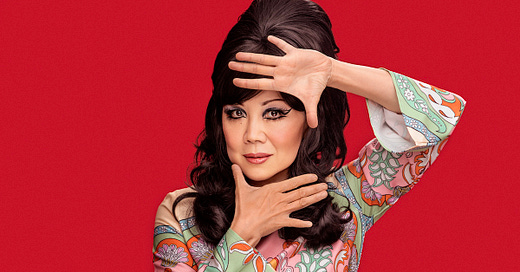


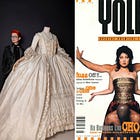
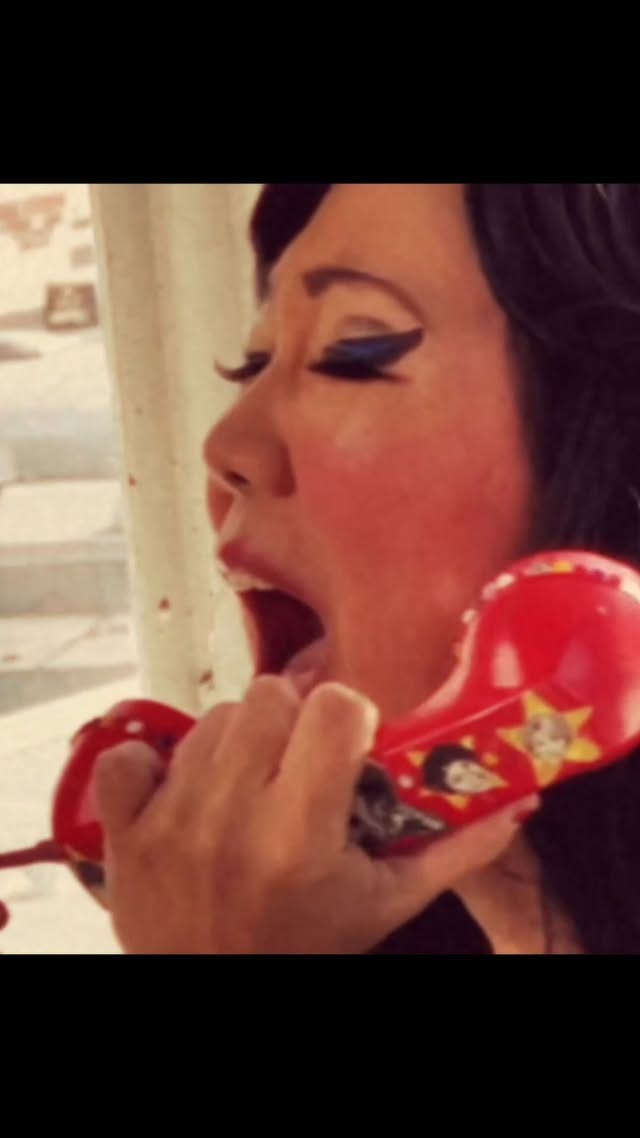
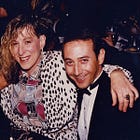
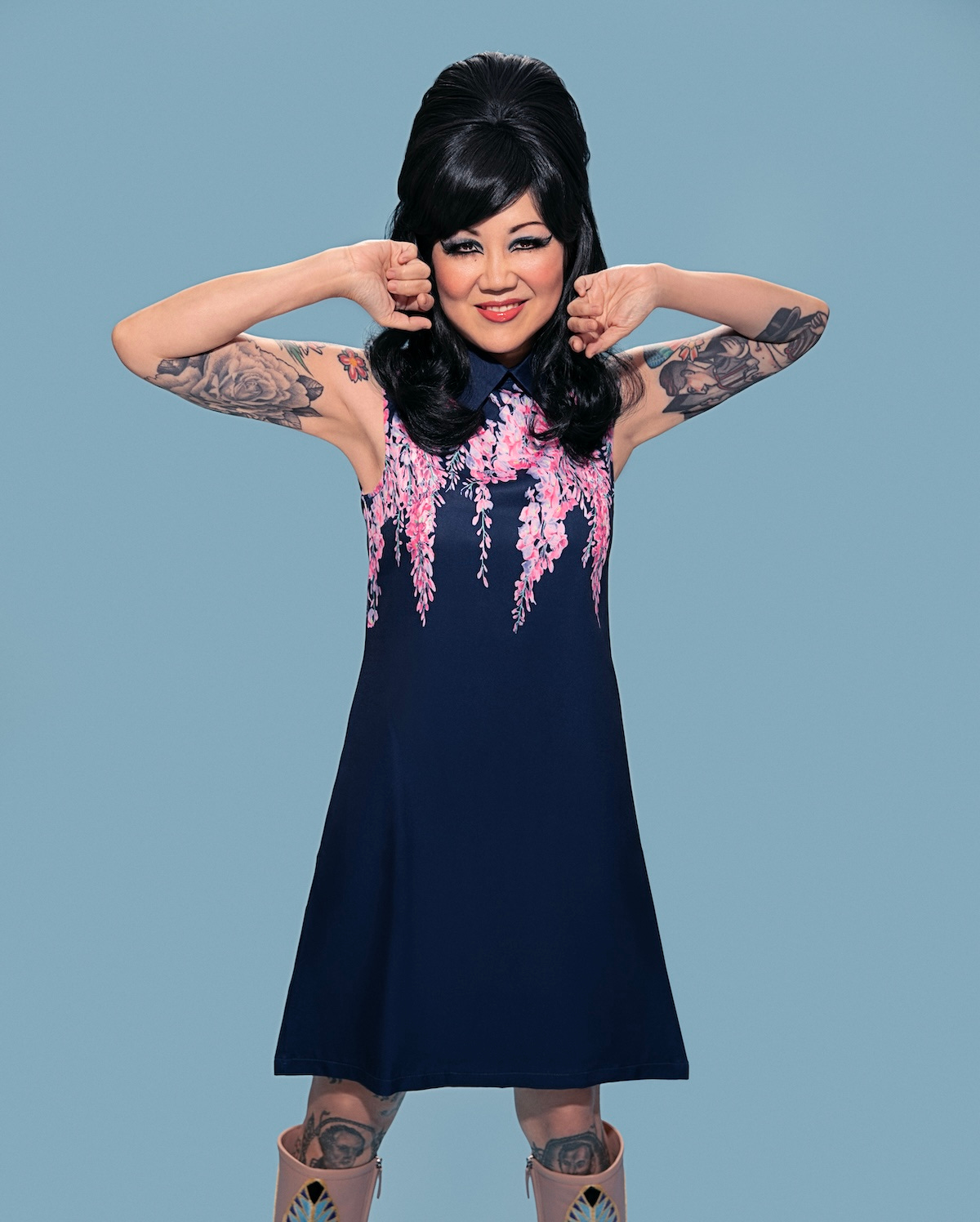
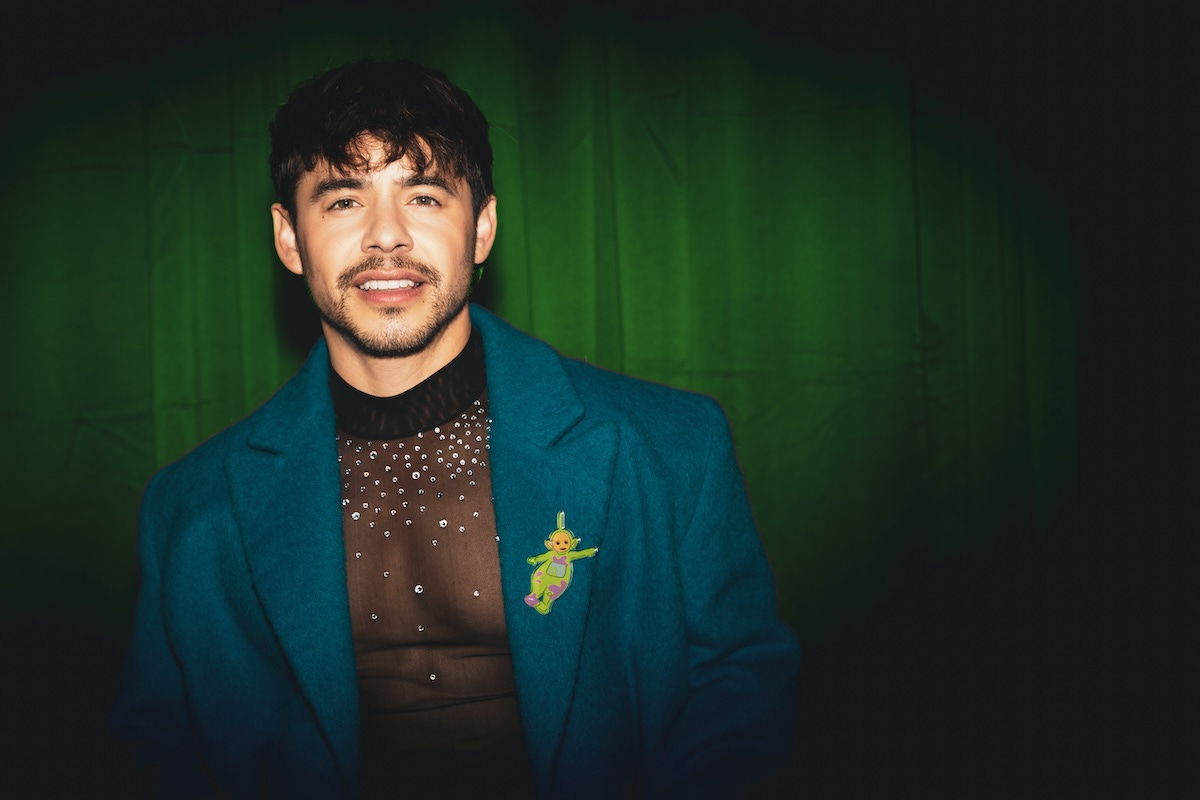

Ermahgerd I can’t believe Freedom ‘90 is turning 35 this year!
I love Margaret Cho! Loved that interview and just nodded along to all the references - gee, it's like I'm Gen X or something. I remember that season of AI and was cheering for him - I'd forgotten that George Michael made an appearance! Thanks so much for all your work, Cheryl and Fawnia!